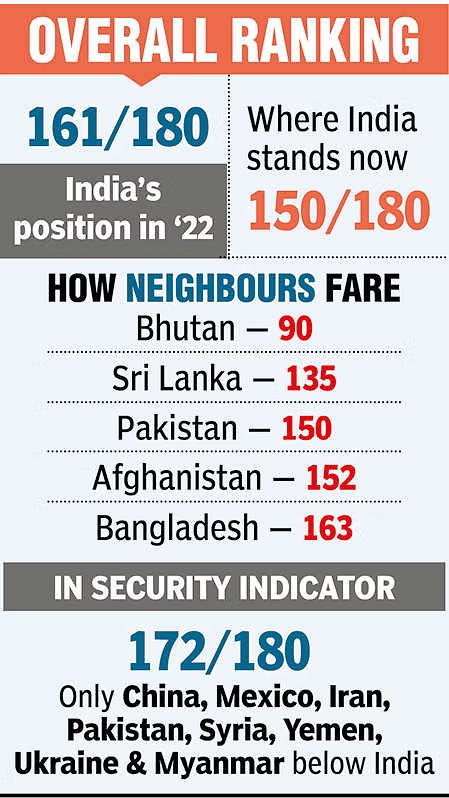World Press Freedom Index 2023 | 04 May 2023
Why in News?
On the World Press Freedom Day (WPFD) (3rd May), the World Press Freedom Index 2023 was published by Reporters Without Borders (RSF).
- India ranked 161st among the 180 countries with a score of 36.62. In 2022, India’s rank was 150.
What is World Press Freedom Day?
- About:
- The day was proclaimed by the UN General Assembly in 1993, following the recommendation of UNESCO’s General Conference in 1991.
- The day also marks the 1991 Windhoek Declaration (adopted by UNESCO).
- To raise public awareness of the value of press freedom, the importance of protecting journalists' rights, and the importance of encouraging independent, free media.
- Theme for 2023:
- 'Shaping a Future of Rights: Freedom of Expression as a Driver for All Other Human Rights'
What are the Key Highlights of the World Press Freedom Index 2023?
- Ranking of Countries:
- Top and Worst Performers:
- Norway, Ireland and Denmark occupied the top three positions.
- Vietnam, China and North Korea were at the bottom on the list.
- India’s Neighbours:
- Sri Lanka also made significant improvement on the index, ranking 135th this year as against 146th in 2022.
- Pakistan is ranked at 150th position.
- The situation has gone from ‘problematic’ to ‘very bad’ in three other countries: Tajikistan (down 1 at 153rd), India (down 11 at 161st) and Turkey (down 16 at 165th).
- Top and Worst Performers:
- India’s Performance Analysis:
- India’s position has been consistently falling in the index since 2016 when it was ranked 133.
- The reasons behind the fall in ranking is the increased violence against journalists and a politically partisan media.
- The other phenomenon that dangerously restricts the free flow of information is the acquisition of media outlets by oligarchs who maintain close ties with political leaders.
- The organisation asserts that many journalists in India are forced to censor themselves due to extreme pressure.
What is the World Press Freedom Index?
- About:
- It has been published every year since 2002 by Reporters Without Borders or Reporters Sans Frontieres (RSF).
- RSF is an independent NGO based in Paris that has consultative status with the United Nations, UNESCO, the Council of Europe, and the International Organisation of the Francophonie (OIF).
- OIF is a 54 french speaking nations collective.
- RSF is an independent NGO based in Paris that has consultative status with the United Nations, UNESCO, the Council of Europe, and the International Organisation of the Francophonie (OIF).
- The report ranks 180 countries based on their level of press freedom, taking into account factors such as censorship, media independence, and the safety of journalists. However, it is not an indicator on the quality of journalism.
- It has been published every year since 2002 by Reporters Without Borders or Reporters Sans Frontieres (RSF).
- Scoring Criteria:
- The Index’s rankings are based on a score ranging from 0 to 100 that is assigned to each country or territory, with 100 being the best possible score (the highest possible level of press freedom) and 0 the worst.
- Evaluation Criteria:
- Each country or territory’s score is evaluated using five contextual indicators: political context, legal framework, economic context, sociocultural context and safety.
What about the Freedom of Press in India?
- The Constitution, the supreme law of the land, guarantees freedom of speech and expression under Article 19, which deals with ‘Protection of certain rights regarding freedom of speech, etc.
- Freedom of press is not expressly protected by the Indian legal system but it is impliedly protected under article 19(1) (a) of the constitution, which states - "All citizens shall have the right to freedom of speech and expression".
- In 1950, the Supreme Court in Romesh Thappar v. State of Madras observed that freedom of the press lay at the foundation of all democratic organisations.
- However, Freedom of press is also not absolute. It faces certain restrictions under Article 19(2), which are as follows-
- Matters related to interests of the sovereignty and integrity of India, the security of the State, friendly relations with foreign States, public order, decency or morality or in relation to contempt of court, defamation or incitement to an offence.

